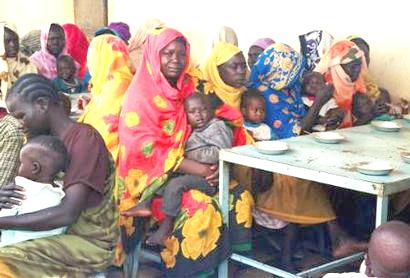FEATURE-South Sudanese women flood prison for wine making

By Opheera McDoom
KHARTOUM, Feb 29 (Reuters) – Suma Alisa, in Sudan’s largest women’s prison for the second time in eight months for making wine, says she has no other way to support her nine children.
Wine making is illegal under Islamic sharia law, introduced in Sudan in 1983, and has been a contentious issue in peace talks to end a bloody 21-year-old civil war in the south of the country that has killed two million people, mostly through famine and disease.
Alisa, a 35-year-old widow, is one of an estimated three to four million Sudanese internally displaced by the fighting that broadly pits the Islamist government against the mainly Christian and animist south, complicated by issues of oil, ethnicity and ideology.
Many southerners come to the capital seeking refuge from the fighting, but find they have no access to education or health care and little hope of finding a job in overcrowded Khartoum.
Arafa Sheikh Musa, head of al-Manar (the beacon) a non-governmental group that works in Omdurman women’s prison in Khartoum, says about 88 percent of inmates are from the south and prison statistics show that since 1992 more than 90 percent are guilty of wine making.
Wine making, while illegal in the Islamist north, is a tradition in the south of Africa’s largest country and many of those involved do not realise they are breaking the law, Musa said.
Even those who know it is illegal find it profitable in dry Khartoum and say it is the only way to make enough money to feed their families while remaining at home to look after them.
“I was making tea and working in someone’s house to make money but then there was no one to look after the children,” said Alisa, 35, cradling her two-month-old son in the prison courtyard.
Asked if, when released from her three-month sentence, she would continue to make wine, her eyes filled with tears: “I know it’s illegal but I don’t know what else to do. I have no family and no home, just a shelter and that has collapsed now.”
CHILDREN IN PRISON
Al-Manar which provides food for the 250 to 350 children brought into the prison every month by mothers who have no family to look after their youngest.
“Most women here are mothers and they take their children up to the age of three with them to prison, but the prison takes no responsibility for them,” said Musa.
“The mothers either have to feed their children from their own rations or buy food into the prison for them.”
Al-Manar is funded by the British embassy in Khartoum and the U.N. children’s agency UNICEF provides some basic medicines. Al-Manar used to provide three meals a day and basic health care to the children and pregnant or lactating women with a budget of $1,500 a month.
“But funds are running short so we have had to cut back to two meals a day for the children only,” said nutritionist Noha Muhammed Gibreel, who works for the equivalent of $75 a month with al-Manar in the prison’s child feeding centre.
Gibreel said the infant mortality rate from malnutrition and disease was four children in every 100 before al-Manar started the feeding centre in 2000. Now it has dropped to zero.
Al-Manar director Musa said a problem was that women tried deliberately to get rearrested, saying that in prison they have meals and medical care for themselves and their children, whereas on the streets of Khartoum they get nothing.
PRISON UNDERFUNDED
Omdurman prison director Saeed Dhahiya said the government pays only for the salaries of the prison staff and the food for the inmates. It does not contribute to any of the other running costs of the prison.
“We make visitors pay an entrance fee and rely on NGOs and charity for the other running costs…but it is still not enough,” he said.
The prison has between 800 to 1,080 inmates at any time, but a capacity of about 500. Every day the prison releases about 40 women but takes in another 40 to 50, Musa said.
Dhahiya said the prison became women-only in 1992 when the numbers of displaced women arrested for wine making suddenly surged as many more southerners fled to the capital.
He said volunteer doctors visited the prison four times a week and the prison relied on donations for medicines for the inmates.
The prison had a workshop where prisoners made crafts and clothes to sell in the market, but last year the roof collapsed and it did not have the money to repair it, he said.
Interior Minister Abdel Rahim Mohamed Hussein said he hoped about 60 percent of the internally displaced southerners would leave the north and return to their homes once a peace deal now being negotiated in Kenya is signed.

dina624
FEATURE-South Sudanese women flood prison for wine making
Exodus 22:20-23
21You shall not ill-treat any widow or orphan.
22If you do mistreat them, I will heed their outcry as soon as they cry out to Me.
23And My anger shall blaze forth and I will put you to the sword, and your own wives shall become widows and your children orphans.
God takes oppression so seriously that he will kill oppressors and make those closest to them vulnerable to the same oppression perpetrated by their husband or father.